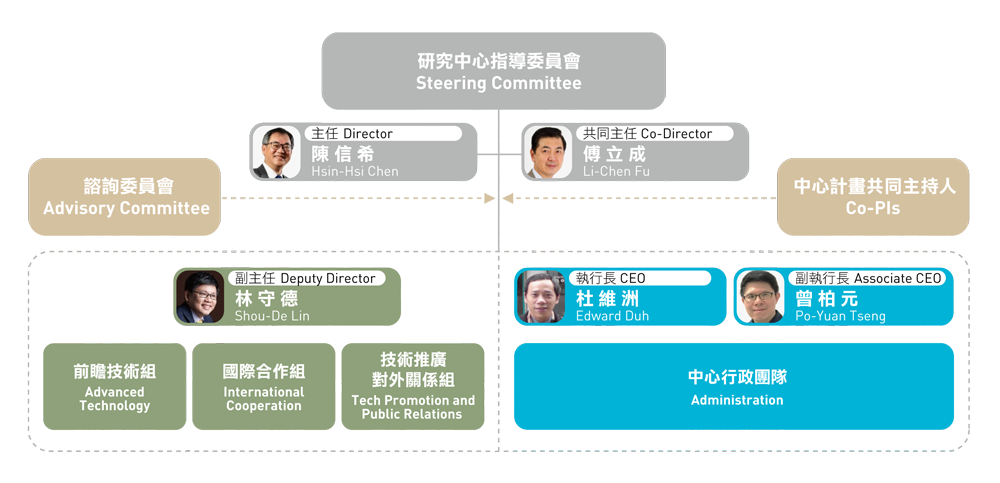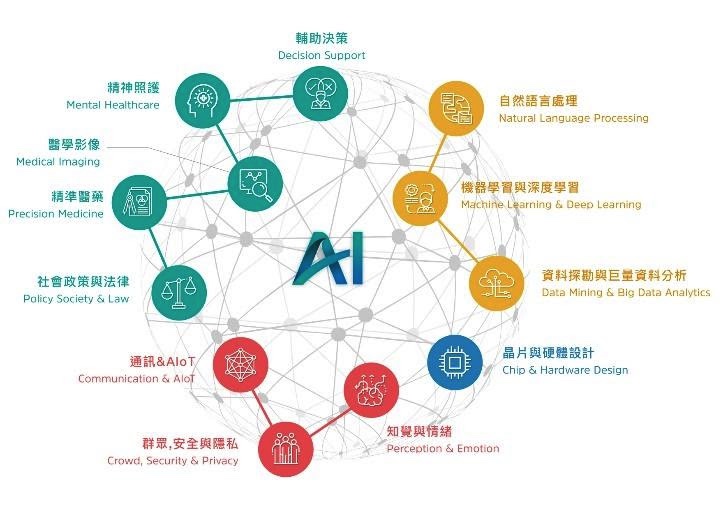臺大人工智慧研究中心
About AINTU
人類社會文明的發展與變遷過程當中科學技術始終扮演著重要推手的角色,隨著智慧時代的來臨,預示著所有人面臨的全新挑戰與機會。科技部於2017年開始極力推動「小國大戰略」的人工智慧策略,投注心力在營造創新人工智慧生態體系,並於2018年1月1日在臺灣設立4個AI創新研究中心,而科技部補助人工智慧技術暨全幅健康照護聯合研究中心,簡稱臺大人工智慧中心,即為其中之一。
After taking office in February 2017, the previous director of the Ministry of Science and Technology (MOST), Dr. Liang-Gee Chen, has vigorously promoted the artificial intelligence (AI) strategy under the “A Grand Strategy for a Small Country” strategy. In order to create an innovative AI ecosystem, the MOST has planned to build world-class AI innovation research centers to achieve the goals of researching and developing cutting-edge technologies, cultivating leaders, and enhancing the potential of commercialization of research and development results. After reviewing the public center research projects, four AI Innovation Research Centers were established in Taiwan on January 1, 2018. “AINTU” stands for the MOST Joint Research Center for AI Technology and All Vista Healthcare, or the Artificial Intelligence Center at National Taiwan University, and is one of the four AI Innovation Research Centers established by the MOST of Taiwan.
臺大人工智慧研究中心以人工智慧技術和生技醫療為兩大主題,分屬於人工智慧技術及全幅健康照護兩個子中心。旨在整合轄下研究計畫,並以跨領域、跨單位、跨國際的合作方式,成為國際級研究中心;與此同時,對內致力於深耕前瞻技術,促進AI創新應用之擴散,並提升我國AI研究能量,培育高階研發人才,促進研究成果在社經發展產生重大貢獻;對外則是藉由頂尖論文的發表、智慧技術競賽的參與、國際會議的主導,打造國際級人工智慧應用資料與技術的發展平台,進一步發揮國際影響力。
AINTU focuses on two major themes: AI technology and its applications in medical and healthcare. There are two sub-centers, Artificial Intelligence Technology (AIT) and All Vista Healthcare (MAHC). Our mission is to integrate our research projects and become an international research center utilizing cross-disciplinary, cross-unit and international collaboration. At the same time, the center is committed to developing forward-looking technology, promoting the proliferation of AI innovation applications, and improving capability of Taiwan’s AI research. We also aim to cultivate high-end research and development talents, and promote research results to make a significant contribution to socioeconomic development.
▎組織 Organization
中心團隊成員包括: 陳信希中心主任、傅立成中心共同主任、林守德副主任、杜維洲執行長、曾柏元副執行長。
本中心屬科技部營造創新人工智慧生態體系之專案計畫,為了要達到國際級 AI 創新研究中心之水準,邀請9位國內頂尖學者擔任共同主持人,包含:林宗男教授(臺大資訊安全技術中心)、張瑞峰教授(臺大資工系)、林智仁教授(臺大資工系)、莊永裕教授(臺大資工系)、賴飛羆教授(臺大生醫電子與資訊學研究所)、黃銘傑教授(臺大法律學系暨研究所)、吳明賢教授(臺大醫學院內科)、何奕倫教授(臺大醫學院內科)、廖弘源研究員(中央研究院資訊科學研究所)分別在其研究領域深耕,以期達成研發尖端技術、培養領導人才、提升研發成果商業化之潛力、衍生 AI新創公司之目的,並且按組織置章程設置諮詢委員會定期開會。
▲ 組織圖/ Organizational Chart
Our team members include: Director Hsin-Hsi Chen, Co-Director Li-Chen Fu, Deputy Director Shou-De Lin, CEO Edward Duh, and Associate Executive Officer Po-Yuan Tseng.
In addition, there are 9 co-principal investigators, including: Tsung-Nan Lin (Information Security Center, NTU); Ruey-Feng Chang (Dept. CSIE, NTU); Chih-Jen Lin (Dept. CSIE, NTU); Yung-Yu Chuang (Dept. CSIE, NTU); Fei-Pei Lai (BEBI, NTU); Ming-Jye Huang (College of Law, NTU); Ming-Shiang Wu (College of Medicine, NTU); Yi-Lwun Ho (College of Medicine, NTU); Hong-Yuan Liao (Academia Sinica.)
除了以上計畫人員編列,中心為了要更完善執行各個面向的業務,按照業務性質規劃了四組,並聘任組長協助業務執行,包含以下:
In order to fulfill each function of the center, four sections of affairs were conducted:
前瞻技術組,李宏毅教授(臺大電機工程學系)擔任前瞻組長:人工智慧技術、工具、資料集分享標準制定;跨領域、跨平台技術整合及平台建置;開發醫療AI應用技術;打造國際級醫療照護AI平台。
The section of advanced technology, led by Hung-Yi Lee (Dept. EE, NTU): establishing the standards of sharing for AI technologies, tools, and datasets; integrating interdisciplinary and cross-platform technologies; developing AI technologies for medical applications; building a world-class platform for medical and healthcare AI.
技術推廣-對外關係組,王鈺強教授(臺大電信工程學研究所)擔任技術組長:人工智慧技術、工具、資料集、整合應用系統之推廣;推動跨中心、跨領域、產官學研醫間技術交流和經驗分享;推動人工智慧人才的培育和養成。
The section of tech promotion and public relations, led by Yu-Chiang Wang (Dept. EE, NTU): promoting AI technologies, tools, datasets, and integration of application systems; developing cross-center or interdisciplinary communications among academia, industry, government, and healthcare institutions; cultivating AI talents.
國際合作組,陳縕儂教授(臺大資訊工程學系)擔任國際組長:負責統合規劃國際合作業務、尋求與國外研發機構合作機會、推動國際雙邊人才交流;建立國際研究合作機制;爭取國際會議主辦權等;推動醫療照護AI國際合作研究聚落。
TThe section of international cooperation, led by Yun-Nung Chen (Dept. CSIE, NTU): managing affairs on international collaborations and searching for opportunities to collaborate with international research institutes; promoting communication between international talents; establishing the guide for international joint research; striving for opportunities to host international seminars; forming an international research cluster to promote collaborations in medical and healthcare AI.
行政業務組:負責中心行政事務之推動;舉辦中心定期會議;蒐集整理轄下計畫研究進度和研究產出;建立網頁和定期發行通訊;研討會、座談會、技術推廣、產業參訪交流、以及人才培育等相關活動之舉辦或協辦。
The section of administration: in charge of executing administrative affairs of the center; conducting regular meetings within the center; collecting and organizing the research results of the project teams; establishing official websites of the center and updating event information; hosting or assisting on seminars, panels, promotion of technologies, corporate visits, and other educational events.
▎目標 Goals
中心轄下共有31個計畫團隊,研究範圍從核心技術到醫療照護應用涵蓋12個研究領域,包含:晶片與硬體設計、資料探勘與巨量資料分析、機器學習與深度學習、自然語言處理、知覺與情緒、群眾,安全與隱私、通訊&AIoT、精準醫藥、精神照護、醫學影像、輔助決策和社會政策與法律。中心轄下計畫在多個面向都持續深耕研究,無論在國內外都繳出優異成績研究成果亮眼。
中心扮演的角色則是整合不同研究類型的計畫無論研究人員或研究資源,協助產、官、學、研跨領域、跨單位、跨國際的多元合作。中心在5個面向的目標包含以下:
1. 研究方面:整合轄下研究計畫,並以跨領域、跨單位、跨國際的合作方式,成為國際級研究中心。
2. 平台方面:結合政府、產業、醫界、學術界,建立跨領域的AI發展平台。
3. 人才方面:培育從基礎到高階的AI人才,滿足國家各機構及產業人才需求。
4. 應用方面:促進AI研究成果應用於社會經濟發展,對社會產生貢獻。
5. 國際方面:厚植臺灣AI研究能量,建立人工智慧資源和影響力,提升臺灣實質國際影響力。
There are 31 research project teams in the AINTU and the research topics cover 12 areas ranging from AI core technologies to applications in medical and healthcare, including chip and hardware design, data mining and big data analytics, machine learning and deep learning, natural language processing, perception and emotion, crowd, security and privacy, communication and AIoT, precision medicine, mental healthcare, medical imaging, decision support, and policy social policy.
The 5 major goals of the center include:
1. Research: Becoming an international research center via the integration of research projects and cross-disciplinary, cross-unit, and international collaborations.
2. Platform: Combining government, industry, medical and academic circles to establish an interdisciplinary AI development platform.
3. Talent: Cultivating AI talents to meet the talent demand from national institutions and the industry.
4. Application: Making contributions to the society by applying research results of AI technologies on social and economic developments.
5. International: Developing Taiwan’s AI research capability to enhance Taiwan’s international influence.
▲ 臺大 AI 中心研究領域/ Research Areas of the AINTU
▎願景 Vision
中心期許自身四大願景以回應社會大眾的期盼,以及面對未來的變遷:
(1)統合跨領域、跨單位之人工智慧計畫團隊開發機器學習與深度學習、資料探勘與巨量資料分析、人工智慧知覺、自然語音與語言處理、人工智慧政策與法律等理論和前瞻技術
(2)引領國內生技醫療團隊,以提升國內生技醫療水平,造福國人健康福祉。同時建立國際AI生醫的重要研究聚落,讓臺灣的重大醫學成就行銷全球
(3)建置充沛生醫資料庫,厚實跨域合作之基礎建設及暢通的國際與產學合作管道
(4)建立人工智慧資源和影響力,養成人工智慧人才,厚實人工智慧產業發展
The vision of AINTU includes the following 4 parts:
(1) Integrating cross-disciplinary and cross-unit AI project teams to develop machine learning and deep learning, data mining and big data analytics, AI perception, natural speech and language processing, and other advanced technologies, as well as AI policy and law.
(2) Leading domestic biomedicine teams to escalate the level of domestic biomedical technology, and benefit the health and well-being of the whole country. And establishing an international research cluster of AI and biomedical practitioners, to promote Taiwan’s major medical achievements to the world.
(3) Building ample biomedical databases, as well as basis for cross-domain collaborations to serve as bridge for international and industry-academia collaboration.
(4) Developing AI resources to cultivate talents to assist on building a solid domestic AI industry.





